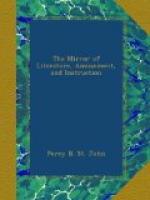That this hope was not vain, the character of the good Alexander, since proved by a life of undeviating promptness to all acts of humanity, may be a sufficient voucher. But whether the homeward-bound chief, found, on his setting his foot again upon the ground whence he had been so cruelly rifled; and whence, indeed, the innocent confidence, the playful bravery of his fond wife, had urged him; whether he found his cherishly-remembered home, yet standing as he left it; and her, still the tender and the true to his never-wandered heart; and whether his children sprang to his knee, to share the parental caress; and the people around, raised the haloo of joy to the returned son of their king!—whether these fondly-expected greetings hailed his arrival, cannot be absolutely told; for the vessel that took him out, was to make the circuit of the globe, ere it returned; hence, from that, and other circumstances, the facts have never reached the narrator of this little history, of what was really the meeting between Laonce and his Berea; of the young chief, and the natives he had devotedly served! But can the faithful hearts of wedded love, doubt the one; or manly attachment suspect the other? For the honour of human nature, we will believe that all was right; and, in the faith of a humble Christian, we will believe, that “he who shewed mercy, found mercy!”; That he is now restored to his island-home, and to his happy, grateful family!
* * * * *
Among the poetical contributions are The Angels’ Call, and Woman and Fame, by Mrs. Hemans; Carthage, and Stanzas, by T.K. Hervey; the Chapel on the Cliff, by W. Kennedy; all entitled to high praise. A Christian’s Day, by Miss A.M. Porter, is a sweet devotional composition. The extract from one of Mr. Atherstone’s unpublished books of the Fall of Nineveh, maintains the high opinion already formed of the published part. Mr. C. Swain has two beautiful pieces. We have only room to name those gems of the poetry, viz. Wearie’s Well, and another beautiful ballad, by W. Motherwell; and some exquisite lines by the Rev. G. Croly; and to quote the following:—




